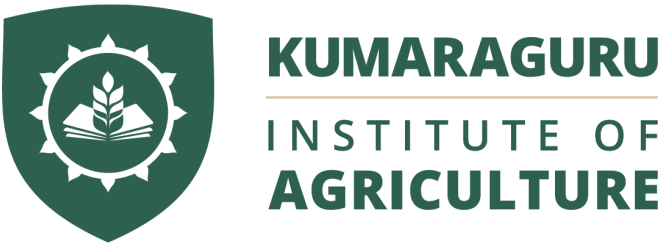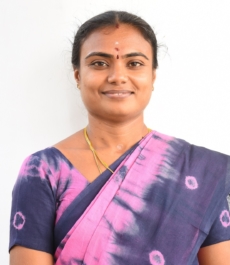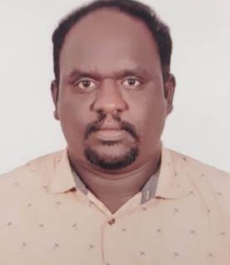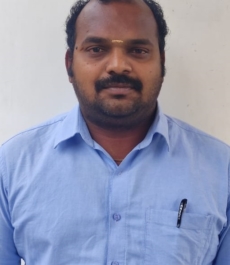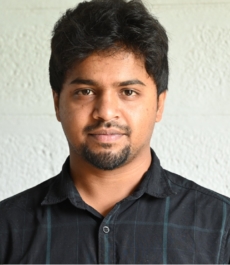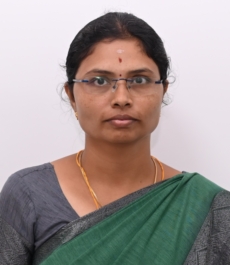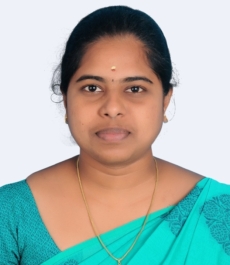Academics
Dr.N.ARUNKUMAR
Dr.N.ARUNKUMAR
Faculty Profile

Name
Dr.N.ARUNKUMAR
Date of Birth
06.11.1984
Designation
Assistant Professor (Agricultural Microbiology)
Department
Crop Management
Qualification
Ph.D., PDF
Additional Qualification
NET/SLET
ASRB -NET (0810300574)
Teaching Experience
KIA – DOJ: 20.09.2021 ; Others 2 Years 9 Months
Publications
1. Arunkumar, N., J. GulsarBanu, N. Gopalakrishnan and Prakash, A.H. 2018. The biochemical correlation between the epicuticular wax of upland cotton (Gossypium hirsutum L.) and the wax of different mealybug species. Phytoparasitica. 46(2): 145-152. DOI: 10.1007/s12600-018-0656-8 (Impact factor – 1.137, NAAS – 7.02)
2. Arunkumar, N., J. GulsarBanu, N. Gopalakrishnan and Prakash, A.H. 2020. Efficacy of Lipase-Producing, Wax-Degrading Bacteria against the Solenopsis Mealybug,Phenacoccussolenopsis Tinsley and the Striped Mealybug, Ferrisia virgata Cockerell(Homoptera: Pseudococcidae). (Impact factor – 0.8, NAAS – 6) https://dx.doi.org/10.17582/journal.pjz/20191107111143
Research articles – 11
Conference papers/ attended – 15
Books (With ISBN) – 4
Awards Won
- Young Scientist Award – Green Reap Welfare Society, Telungana, India in 2017.
- Best young researcher award – GRABS Educational Trust, Chennai, India. 2016.
- Best research paper award – TNAU and Agriculture Tamil Society, New Delhi, 2017.
- Best research presentation award- Advances in Agriculture through Sustainable Technologies and Central Coastal Agricultural Research Institute, Goa. India. 2017.
Fellowships
- ICAR Senior Research Fellowship 2010- Indian Council of Agricultural Research (ICAR), New Delhi. India.
- National Post Doctoral Fellowship 2016 to 2018 – Grant Number: PDF/2015/000844 from Science & Engineering Research Board (SERB), Department of Science and Technology, Government of India.
Placement Future Plans
Placement Future Plans
Entrepreneurship Development Plan
The Entrepreneurship Development Cell (EDC) will be devised on the Campus soon. The preliminary works are going on. The interested students can enroll in EDC. The cell will expose students to the opportunities of Agri-Entrepreneurship through guest lectures, periodical exposure visits, participation in various Idea thon and Entrepreneurship related exhibitions and competitions. They get a platform to familiarise themselves with Business Incubators (preferably Agri-Business Incubators, TNAU) to scale up their ideas. After sensing their aptitude in Agri-Entrepreneurship, the students will form groups based to share ideas.
Seed Fund Scheme (SFS)
An amount of credit (one to two lakhs) without interest will be provided to an eligible group of 2 to 5 students (Third & Final years) to stimulate their interest in agri-entrepreneurship. An expert committee comprising Principal, PC Officers, and Subject experts will select the group based on their idea on agriculture, horticulture, farm machinery, livestock, fishery, post-harvest & value addition, marketing. The students can use KIA Farm. The Institute will provide technical support, land, threshing flour, storage godown, water, and other necessary items for producing goods free of cost in the initial stage. The students have to repay the amount within two years from the production year.
Entrepreneurship – Women
It aims to train the women graduates with a couple of entrepreneurship activities. The thrust areas in the plan are food processing, pulses, rice, and wheat flour making, papad making, masala, and pickles using the pieces of equipment in the institute. It also plans for a crash course on Women Entrepreneurship for six months or one year (150-200 hours per course).
Placement Cell
Placement
Kumaraguru Institute of Agriculture successfully maintains a potent Placement Cell helping students to get placements in reputed firms. The Placement Cell plays a central role in locating job opportunities for the students passing out from the college. It keeps in touch with the firms and the industrial establishments and initiates the meeting of companies and our students.
The Placement Cell organizes career guidance programmes for all the students. It schedules and coordinates Training Programmes, Mock Interviews, Group Discussions, and Communication Skills workshops. The cell also organizes Public Service Exam Training for students who are interested in joining Government Sectors.
Objectives
- 1.Training the students to face the recruitment process.
- 2.Motivating the students to develop technical knowledge and soft skills.
- 3.Guiding the students in career planning and goal setting.
- 4.Inspiring the students to aspire for higher studies and to attend competitive exams such as ICAR-JRF, FCI, NABARD, CAT, TOEFL, GRE, UPSC, TNPSC, and the like Motivating the students to develop agro-based entrepreneurship skills.
- 5.Helping maximum number of students to clear the campus & off-campus interviews.
Career Development Activities
1.Guest lecture
KIA organises the Guest lectures of the experts from different fields (IAS, IPS, IFS, Entrepreneurs, and Bank Officials) monthly once. It opens a vast window of opportunities, creates interest, and motivates the students.
2.Noble vision
KIA scientists handle lectures about renowned agricultural scientists, reputed agricultural institutes, S&T breakthroughs, agricultural policies, and programme to familiarise students with these. The session is organised every week on Monday between 4.00 PM and 5.00 PM.
3.Study circle
It aims to assist students in selecting their subjects of interest for Post-Graduation in SAUs, ICAR Institutes and Foreign Universities, and other competitive exams. Students interact with Scientists every Wednesday evening.
3.Coaching classes
KIA Scientists provide special coaching for the ICAR- Junior Research Fellowship Exam during the evening hours free of cost. The classes are on the subjects like Plant Breeding and Genetics, Agronomy, Soil Sciences, Agricultural Chemistry, Plant Protection, Horticulture, and Social Sciences. Our institute joins hands with the Pioneer Coaching Institute, Erode, TIME, and Satya IAS Academy for providing coaching and guidance in Civil Services/ UPSC Exams, Bank Coaching – Special Officer (Agriculture) & PO, MBA/ PG Diploma Courses – CAT & CMAT and TOEFL / IELTS Exams. These institutes charge only a nominal fee from the students. The sessions are on weekends and holidays.
4.Workshops
The placement cell organises workshops for the final year students to improve their soft skills in the first week of February. It covers resume writing, group discussion, and personal interview.
5.Entrepreneurship Development – Training and Exposure
The leading agro-entrepreneurs are invited to the college periodically to motivate the students in agriculture and allied sectors. As part of this, the cell organised a single-day training on ‘Value Addition of Agricultural Crops’ for the final year students of the 2015-19 batch on the first week of May 2019.
6.Newspaper subscription
The Hindu daily newspaper is subscribed to all the students residing in the hostel. The employment newspaper is made available in the library.
7.Internships
The cell organises internships during summer to volunteer students in organic farming, value addition of millets, and dairy farms. The firms like ABT Industries Ltd., Pollachi; Raaki Eco Farm, Anthiyur, Erode; and Siruthuli – Miyawaki, Coimbatore take in students as interns.
8.Ideathon
Ideathon is a short, intensive, workshop-like experience for students to address some of the most pressing challenges of our time. Participants work in teams and use design thinking and innovative learning practices to ideate and collaborate on possible solutions.
9.Group Discussion (GD) Forum
The Placement Officers mediates the Group Discussion Forum. It is held virtually in MS Teams at evening 7.30 every day. Final year and third-year students interested can participate in the discussion. Three burning topics are given daily before 1 PM for preparation. The topics for discussion are selected based on voting. The students discuss for 20 minutes.
10.Placement Status
Courses & Syllabus
Courses & Syllabus
I SEMESTER
| S.No | Course Code | Course Title | Credit Load |
|---|---|---|---|
| 1. | AGR 101 | Fundamentals of Agronomy and Agricultural Heritage | 1+1 |
| 2. | BIC 101 | Fundamentals of Plant Biochemistry | 2+1 |
| 3. | SAC 101 | Fundamentals of Soil Science | 2+1 |
| 4. | FOR 111 | Introduction to Forestry | 2+1 |
| 5. | ENG 101 | Comprehension & Communication Skills in English | 1+1 |
| 6. | HOR 111 | Fundamentals of Horticulture | 1+1 |
| 7. | MAT 111 | Elementary Mathematics | 1+1 |
| 8. | PBG 101 | Introduction to Agricultural Botany | 1+1 |
| 9. | AEX101 | Rural Sociology & Educational Psychology | 2+0 |
| 10. | TAM101/ENG103 | Development Education | 0+1 |
| 11. | NSS/NCC 101 | NSS/NCC | 0+1* |
| 12. | PED101 | Physical Education | 0+1* |
| 13. | PED102 | Yoga for human excellence | 0+1* |
| *Non-gradial courses compulsory courses |
II SEMESTER
| S.No | Course Code | Course Title | Credit Load |
|---|---|---|---|
| 1. | SWE 112 | Soil and Water Conservation Engineering | 1+1 |
| 2. | CRP 101 | Fundamentals of crop Physiology | 2+1 |
| 3. | AEC 102 | Fundamentals of Agricultural Economics | 1+1 |
| 4. | AGM 101 | Fundamentals of Microbiology | 2+1 |
| 5. | AEX 102 | Fundamentals of Agricultural Extension Education | 2+1 |
| 6. | FSN 111 | Principles of Food Science and Nutrition | 1+1 |
| 7. | AGR 102 | Introductory Agro-meteorology & Climate Change | 1+1 |
| 8. | HOR 112 | Production Technology for Fruit and Plantation Crops | 1+1 |
| 9. | RSG 101 | Geo- informatics for Precision Farming | 1+0 |
| 10. | NSS/NCC 101 | NSS/NCC | 0+1* |
| 11. | PED 101 | Physical Education | 0+1* |
| Total | 13+8=21 | ||
| *Non-gradial courses compulsory courses |
III SEMESTER
| S.No | Course Code | Course Title | Credit Load |
|---|---|---|---|
| 1. | PAT 201 | Fundamentals of Plant Pathology | 2+1 |
| 2. | AEN 201 | Fundamentals of Entomology | 2+1 |
| 3. | SST 201 | Principles of Seed Technology | 2+1 |
| 4. | AGR 201 | Crop Production Technology – I (Kharif crops) | 1+1 |
| 5. | HOR 211 | Production Technology for Vegetables and Spices | 1+1 |
| 6. | ENS 201 | Environmental Studies & Disaster Management | 2+1 |
| 7. | AMP 201 | Livestock and Poultry Management | 2+1 |
| 8. | AEC 201 | Farm Management, Production & Resource Economics | 1+1 |
| 9. | SAC 201 | Soil Resource Inventory | 1+1 |
| 10. | FMP 211 | Farm Machinery and Power | 1+1 |
| 11. | AGR 202 | Study tour | 0+1* |
| 12. | NSS/NCC 101 | NSS/NCC | 0+1* |
| 13. | PED101 | Physical Education | 0+1* |
| Total | 15+10=25 | ||
| *Non-gradial courses compulsory courses |
IV SEMESTER
| S.No | Course Code | Course Title | Credit Load |
|---|---|---|---|
| 1. | PBG 201 | Fundamentals of Genetics | 2+1 |
| 2. | AEX 201 | Communication Skills and Personality Development | 1+1 |
| 3. | STA 211 | Statistical Methods | 1+1 |
| 4. | PAT 201 | Principles of plant disease management | 1+1 |
| 5. | AEN 202 | Management of beneficial and harmful insects | 2+1 |
| 6. | AGR 203 | Crop Production Technology – II (Rabi crops) | 1+1 |
| 7. | AGR 204 | Farming System & Sustainable Agriculture | 1+1 |
| 8. | SAC 202 | Problematic soils and their management | 2+0 |
| 9. | HOR 212 | Production Technology for Ornamental Crops, MAP and Landscaping | 1+1 |
| 10. | ANM 201 | Introductory Nematology | 0+1 |
| 11. | NST 201 | Fundamentals and Applications of nanotechnology | 1+0 |
| 12. | ERG 211 | Renewable Energy and green technoloy | 1+1 |
| 13. | NSS/NCC 101 | NSS/NCC | 0+1* |
| 14. | PED101 | Physical Education | 0+1* |
| 13. | PED102 | Yoga for human excellence | 0+1* |
| Total | 14+10=24 | ||
| *Non-gradial courses compulsory courses |
V SEMESTER
| S.No | Course Code | Course Title | Credit Load |
|---|---|---|---|
| 1. | PBG 301 | Fundamentals of Plant Breeding | 2+1 |
| 2. | AEC 301 | Agricultural Marketing Trade & Prices | 2+1 |
| 3. | AGM 301 | Agricultural Microbiology | 1+1 |
| 4. | PAT 301 | Diseases of Field and Horticultural crops and their management – I | 1+1 |
| 5. | ARM 301 | Entrepreneurship Development and Business Management | 1+1 |
| 6. | HOR 111 | Practical Crop Production – I (Kharif crops) | 0+2 |
| 7. | HOR 301 | Post harvest management and value addition of fruits and vegetable crops | 1+1 |
| 8. | SAC 301 | Manures, Fertilizers and Soil Fertility Management | 2+1 |
| 9. | APE 311 | Protected Cultivation and Secondary Agriculture | 1+1 |
| 10. | AGR 302 | Rainfed Agriculture & Watershed Management | 1+1 |
| 11. | AEN 301 | Pests of Field crops and stored produces and their management | 1+1 |
| 12. | NCC101 | NCC* | |
| Total | 13+12=25 | ||
| *Non-gradial courses compulsory courses |
VI SEMESTER
| S.No | Course Code | Course Title | Credit Load |
|---|---|---|---|
| 1. | AEC 302 | Agricultural Finance and Co-Operation | 2+1 |
| 2. | PAT 302 | Diseases of Field and Horticultural crops and their management -II | 2+1 |
| 3. | COM 311 | Agro Informatics | 1+1 |
| 4. | ENS 301 | Environmental Pollution and Management | 1+1 |
| 5. | AEN 301 | Pests of Crops and Stored grain and their Management | 2+1 |
| 6. | AGR 303 | Practical Crop Production – II (Rabi crops) | 0+2 |
| 7. | AGR 304 | Principles of organic Farming | 1+1 |
| 8. | ABT 301 | Plant Bio technology | 2+1 |
| 9. | PBG 302 | Crop Improvement | 2+1 |
| 10. | OPT 301 | Optional course | 1+1 |
| 11. | AEN 301 | Pests of Field crops and stored produces and their management | 1+1 |
| 12. | NCC101 | NCC* | |
| Total | 13+11=24 | ||
| *Non-gradial courses compulsory courses |
VII SEMESTER
| S.No | Course Code | Course Title | Credit Load |
|---|---|---|---|
| 1. | AEX 401 | Student READY programme (Rural Agricultural Work Experience and Agro-industrial Attachment) | 0+20 |
| 2. | AGR 401 | Project Report Preparation, presentation and Evaluation | 0+1 |
| 3. | AEX 402 | All India Study Tour* | 0+1 |
VIII SEMESTER
| (Experiential Learning Programme/ HOT) | |
|---|---|
| Module | Credit Hrs. |
| Module – I | 0 + 10 |
| Module – II | 0 + 10 |
| Total | 20 |
| S.No | Course Code | Course Title | Credit Load |
|---|---|---|---|
| 1. | AGM 451 | Bio-inoculant production technology | 0+10 |
| 2. | HOR 451 | Hybrid Seed Production in Vegetable Crops | 0+10 |
| 3. | SAC 451 | On Farm Advisory for Soil Health, Water Quality & Plant Nutrition | 0+10 |
| 4. | AEN 451 | Commercial Beekeeping | 0+10 |
| 5. | SER 451 | Commercial Cocoon Production | 0+10 |
| 6. | ABT 451 | Commercial Plant Tissue Culture | 0+10 |
| 7. | HOR452 | Commercial Nursery Technology of Horticultural Crops | 0+10 |
| 8. | HOR 453 | Commercial Landscape Gardening | 0+10 |
| 9. | PAT 451 | Commercial production of Bio-control agents | 0+10 |
| 10. | PAT 452 | Commercial mushroom production | 0+10 |
| 11. | AMP 451 | Commercial broiler and layer production | 0+10 |
| 12. | SST 451 | Commercial seed production | 0+10 |
| 13. | PBG 451 | Hybrid pearl millet seed production | 0+10 |
| 14. | PBG 452 | Hybrid rice parental line seed production | 0+10 |
| 15. | ARM 451 | Managerial skills for Agribusiness | 0+10 |
| 16. | AGR 451 | Development of Integrated Farming system Model | 0+10 |
| 17. | HOR 454 | Protected cultivation of Vegetable crops | 0+10 |
| 18. | ENS 451 | Composting technology | 0+10 |
| 19. | AGR 452 | Organic Agriculture | 0+10 |
Scholarship and Awards
Scholarship and Awards
Scholarships
The institution helps the students to apply for financial assistance through the scholarships sanctioned by the Government of Tamil Nadu for BC, MBC/ DNC, SC, and ST communities. Faculty is nominated to provide all help and assistance to the students applying for these scholarships.
RamasamyChinnammal Trust, Coimbatore has come forward to meet the educational expenses of an economically weaker student Mr.K.Harish of second year B.Sc (Hons) Agriculture admitted through TNAU Counselling.
Every year Founder Day is celebrated on March 21, on the birth anniversary of our founder Chairman PadmabhushanDr.N.Mahalingam. The Mahatma Gandhi Scholarship for meritorious students, winners in sports, and best performers in NSS activities are distributed.
SCHOLARSHIP DETAILS (2014-2022)
| Batch | BC/MBC/DNC Scholarship | SC/ST Scholarship | First Graduate Fees Concession | Pudhumai Penn (MRAHEAS) | 7.5% |
|---|---|---|---|---|---|
| 2014 | 17 | 12 | 20 | – | – |
| 2015 | 22 | – | 26 | – | – |
| 2016 | 23 | 2 | 21 | – | – |
| 2017 | 29 | 2 | 26 | – | – |
| 2018 | 34 | 2 | 38 | – | – |
| 2019 | 36 | 5 | 34 | 2 | – |
| 2020 | 40 | 7 | 32 | – | 7 |
| 2021 | 37 | 3 | 34 | 5 | 8 |
| 2022 | 51 | 08 | 30 | – | – |
| Total | 289 | 31 | 261 | 7 | 15 |
Rules and Regulations
Academic Regulations
Rules and Regulations
SEMESTER SYSTEM RULES AND REGULATIONS
Undergraduate Programme
2022
Academic Calendar
Academic Calendar
Exam Cell
CoE Corner
The Examination pattern for the B.Sc (Hons) Agriculture includes:
Mid Semester Examination
The mid semester examinations are to be conducted in the regular classes. The mid-semester examination mark list should reach the office of the Controller of Examinations within fifteen days from the date of conduct of mid-semester examination.
Missing Examination
there will be no missing tests for mid semester examinations from the ensuing semester onwards. If absent for the mid-semester examination, the student will be awarded ‘’0’’ marks for mid-semester.However, the student is permitted to continue attending the classes and write the final practical and final theory examinations.
Theory Examination
The final theory examinations are to be conducted outside the working days of the semester. An examination schedule approved by the Dean and the Controller of Examinations for the mid-semester and final examinations, respectively, shall be final. Mess dues should be cleared before final theory exams and clearance certificate should be produced for receiving hall tickets
Practical Examination
The practical examination is to be conducted on the last practical class. The Dean of Colleges will announce the schedule of final practical examinations. The Controller of Examinations, based on the proposal sent by the Deans concerned, will nominate and approve the external examiner and the course teacher shall be the internal examiner. In case of affiliated colleges, the external examiners will be nominated by the Controller of Examinations. In the event of external/ internal examiner nominated for practical examination could not conduct the examination, then the Dean concerned shall nominate an alternative examiner to conduct practical examination in anticipation of approval by the Controller of Examinations. Submission of bona fide practical records certified by the Course Teacher is a pre-requisite for appearing in the practical examinations failing which ‘F’ grade will be awarded. The duration of practical examination shall be two and a half hours. The practical marks should be communicated to Controller of Examinations within 10 days of the last working day of the Semester..
Guidelines
Wherever experiments, identification or case studies are not possible as per course curricula, the question pattern may be modified by the Course Teacher (Internal examiner) and the pattern should be well informed to students in advance before exam. The same will be informed to the External Examiner also before the start of practical examination..
If a student fails to write Practical Examination, `F’ grade will be awarded. The student has to appear for the reappearance practical examination.
Postponement of Final Examination
Whenever the Government declares holidays on the dates of final examinations or under exigencies, the examination that falls on the particular date will be postponed to the date after the last examination of the original examination schedule. Changes, if any, will be notified by the Controller of Examinations, TNAU.
Re- Appearance and Improvement
The students are permitted to write the re-appearance examination as and when conducted with the permission of Deans of Colleges. Re-appearance fee of Rs.500/- per exam is to be paid online on or before the prescribed date.
Reappearance Exam
A student is permitted to write either theory or practical examination alone or both in the reappearance examination for the failed subjects. A student is permitted to write reappearance examination for the failed subjects any number of times within n+4 years duration excluding the regular final examination. The registration for the re-appearance shall be done on the date specified by the Controller of Examinations. Each registration is considered as an attempt even if the student is absent for the examination. Mark obtained in the latest theory / practical examination will be retained for processing of results. Re-appearance exams only with Multiple Choice Questions (MCQ) in OMR mode in the following pattern..
Reappearance examination will be applicable to industry and institutional educational tours, RAWE, agro industrial tie-up programmes, crop production and non-gradial compulsory courses if the student having hundred per cent attendance.
Improvement exam
A student with an OGPA of less than 6.50 is eligible to write improvement examination. Improvement exam is permitted for both final theory and practical examinations and a student opting for improvement is required to write both final theory and practical examinations. For this course, the original marks secured by the student in the mid-term exam will be retained. The student has to write the Improvement Examination only along with the final semester exams, both theory and practical as may be applicable, along with the junior batches. In case a student fails to secure higher grade point in the improvement examination, the higher grade point secured by the student in regular examination will be taken for grading. Improvement examination will not be applicable to industry and institutional educational tours, RAWE, agro industrial tie-up programmes and crop production. Students opting for improvement examination, has to take up the concerned reappearance examination when called for by registering and paying the fee applicable for reappearance examination.
Skipping of course(s) and semester is not permitted in any case
If the student fails to accomplish the residential requirement of course(s) in a semester, he is not permitted to continue the subsequent semester(s)..
Skipping of course(s) and semester is not permitted in any case
If the student fails to accomplish the residential requirement of course(s) in a semester, he is not permitted to continue the subsequent semester(s)..
However, If a student awarded “E” grade only in one course (1+1/2+1/1+0/2+0/1+2) in the preceding semester, he/she may be permitted to register the course in the next/subsequent semester, when offered for the juniors, along with other courses provided the maximum permissible credit load of 27 should not exceed.
The student can be permitted to continue with this pattern till end of fourth semester. At the end of fourth semester he/she has to complete all the pending courses failing which, he/she has to continue studies with his junior only after completion of all pending courses.
If the student has pending courses of fifth and sixth semester, he/she may be permitted to continue seventh semester till there is no change in the existing courses of VII semester (RAWE, tour, and project work). The student may be permitted to register the pending courses of fifth and sixth semesters in the VIII semester not exceeding 27 credits, following the 105 working days pattern. For reappearance exams, the rule enforced by the Controller of Examinations from time to time will be applicable.
The minimum Grade Point to be secured for a pass in a course is 6.00 out of 10.00, a total of 60 Marks out of 100..
Students who fail and want to apply for revaluation are permitted to do so only if the required mark falls within 10 % of final theory mark (4 marks for 2+1/1+1 courses and 6 marks for 2+0 /1+0 courses) and if more than 10%, they can apply only for retotaling with same fee.
Only Failed students are eligible to apply for revaluation of final theory answer script. A maximum grace mark of 1.0, applicable to both theory and practical, is awarded to students, if required, to pass an examination as under para 8.3 provided the student should have secured 50 % mark in both theory and practical separately..
A student has to maintain a minimum OGPA of 6.50 out of 10.00 and passed all the courses and completed the credit requirements as per the applicable syllabus at the end of final year (8th semester) to become eligible for the award of degree.
Exam pattern and Duration
Regular
| Exam | 1+1/2+1 courses | 1+0/2+0 courses | 0+1/0+2 courses |
|---|---|---|---|
| Mid semester | 10 (20 marks converted to 10) (1 hour) | 40 (1½ hours) | 40 (1½ hours) |
| Practical | 40 (2½ hours) | – | 60 (2½ hours) |
| Final theory | 50 (2½ hours) | 60 | – |
| Total | 100 | 100 | 100 |
Reappearance Exam
| Course details | Question pattern & marks | Mode of exam | Duration |
|---|---|---|---|
| Courses with Theory and Practical | Multiple Choice Questions (MCQ) (60 x 1 = 60 marks) | OMR | 75 minutes |
| Courses with Theory alone | Multiple Choice Questions (MCQ) (100 x 1 = 100 marks) | OMR | 120 minutes |


